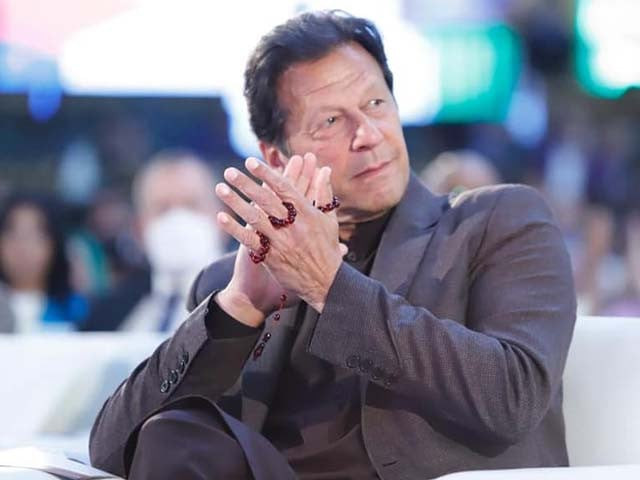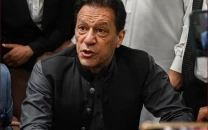PM felicitates Muslim world as March 15 declared Islamophobia day
Premier Imran says United Nations has finally recognised the issue confronting the world by adopting the resolution

Prime Minister Imran Khan on Tuesday felicitated the Muslim world as the United Nations (UN) adopted a resolution designating March 15 as the International Day to Combat Islamophobia.
"I want to congratulate the Muslim Ummah today as our voice against the rising tide of Islamophobia has been heard and the UN has adopted a landmark resolution introduced by Pakistan, on behalf of OIC, designating 15 March as International Day to Combat Islamophobia," the premier said in a Twitter post.
I want to congratulate the Muslim Ummah today as our voice against the rising tide of Islamophobia has been heard & the UN has adopted a landmark resolution introduced by Pakistan, on behalf of OIC, designating 15 March as International Day to Combat Islamophobia.
— Imran Khan (@ImranKhanPTI) March 15, 2022
"Today UN has finally recognised the grave challenge confronting the world: of Islamophobia, respect for religious symbols & practices & of curtailing systematic hate speech and discrimination against Muslims. Next challenge is to ensure implementation of this landmark resolution," he added.
Today UN has finally recognised the grave challenge confronting the world: of Islamophobia, respect for religious symbols & practices & of curtailing systematic hate speech & discrimination against Muslims. Next challenge is to ensure implementation of this landmark resolution.
— Imran Khan (@ImranKhanPTI) March 15, 2022
The credit for introducing the day also goes to Pakistan as it had presented a resolution in this regard at the 47th session of foreign ministers of the nations forming the Organisation of Islamic Cooperation (OIC) Council, held in Niamey, Niger in 2020.
Since then, the 57-member organisation has been working with the international community to commemorate the day.
Also read: International day against Islamophobia to be observed today
At the world platforms including the UN General Assembly, PM Imran Khan has been calling upon the leaders to act against Islamophobia and “act collectively to counter growing phenomenon in non-Muslim states".
He has also regularly highlighted the appalling rise in Islamophobia and associated hatred in his addresses to the UN General Assembly, pointing towards its serious ramifications.
Islamophobia has already led to negative profiling, mob lynching by cow vigilantes, discriminatory laws, attacks on women wearing hijab, ban on minarets and attempts to link and equate Islam with terrorism.
'Islamophobia is a reality'
Earlier today, the UN General Assembly adopted, by consensus, a resolution, introduced by Pakistan on behalf of the OIC, that proclaims March 15 as International Day to Combat Islamophobia, saying it was aimed at promoting a culture of tolerance ad peace globally.
Under its terms, the resolution strongly deplores all acts of violence against persons on the basis of their religion or belief and such acts directed against their places of worship, as well as all attacks on and in religious places, sites and shrines that are in violation of international law.
“Islamophobia is a reality,” Ambassador Munir Akram, permanent representative of Pakistan, told the 193-member Assembly, noting that the phenomenon was growing and must be addressed.
He said PM Imran was the first to raise the issue of Islamophobia at the UN in his historic 2019 address to the General Assembly, and had repeatedly called for international attention and efforts to address it.
In his introductory remarks, Ambassador Akram said Islamophobia’s manifestations – hate speech, discrimination, and violence against Muslims – are proliferating in several parts of the world.
“Such acts of discrimination, hostility and violence towards Muslim individuals and communities constitute grave violations of their human rights and violate their freedom of religion and belief; they also cause great anguish within the Islamic world.”
Noting the report of UN Special Rapporteur on Freedom of Religion or Belief that “Since 9/11 terrorist attacks, institutional suspicion and fear of Muslims and those perceived to be Muslim has escalated to epidemic proportions,” he said in such climates of exclusion, fear and distrust, “Muslims often feel stigma, negative stereotyping and shame and a sense that they are ‘suspect communities’ that are being forced to bear collective responsibility for the actions of a small minority.
“The spread of Islamophobia, both in terms of the phenomenon’s momentum and outreach, is particularly alarming these days, for it has emerged as a new form of racism characterized by xenophobia, negative profiling and stereotyping of Muslims,” Ambassador Akram said.
“The rise in hate crimes against Muslims both offline and online, as well as discrimination in education, citizenship, immigration, employment, housing and healthcare sector, among others are well documented.
“The gender aspect of Islamophobia is also gaining prominence, with girls and women being targeted due to mode of their dress and the general notion that Muslim women are oppressed and thus must be ‘liberated’.”
What indeed is worrisome, the Pakistani envoy said, is that Islamophobia “continues to find strong resonance in political spheres, ultimately leading to the institutionalization of Islamophobia through new legislation and policies such as discriminatory travel bans and visa restrictions”.
“Various academic studies have revealed that Islamophobia is most visible in the media and in the discourse of far-right groups and political parties and groups, who tend to exploit and build on the general fear of Islam for electoral gains.”
In some countries, he said anti-immigration and anti-refugee rhetoric had taken an anti-Muslim overtone and had often become the central theme of political campaigns.
Ambassador Akram voiced grave concern that several media outlets continued to propagate fear and negative stereotypes against Islam and Muslims, notably by acting as a platform for the widespread dissemination of anti-Muslim rhetoric.
“Despite its pervasive impacts, Islamophobia remains poorly understood, it is essential to promote greater information of this phenomena and promote solutions through greater understanding and full respect for human rights and fundamental freedoms.”
(With additional input from APP)



















COMMENTS
Comments are moderated and generally will be posted if they are on-topic and not abusive.
For more information, please see our Comments FAQ